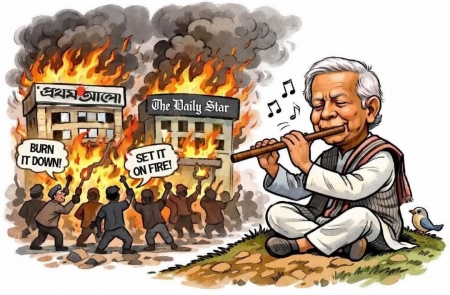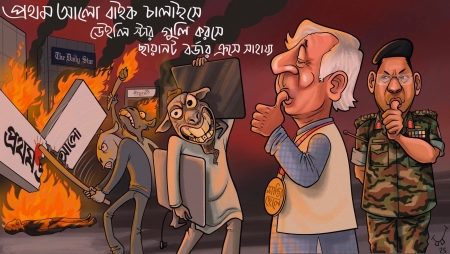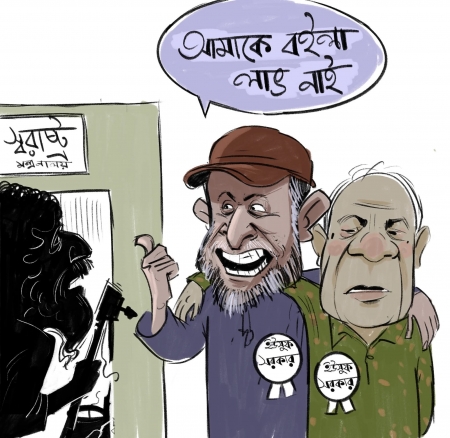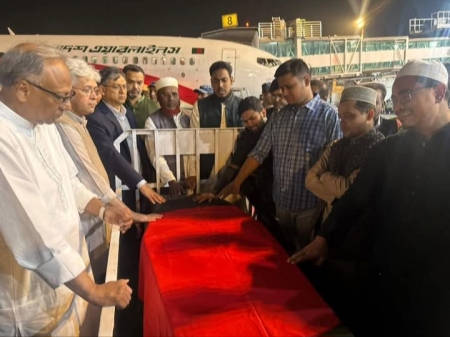প্রলেতারিয়াত কারা ?
What is the proletariat?
The proletariat is that class in society which lives entirely from the sale of its labor and does not draw profit from any kind of capital; whose weal and woe, whose life and death, whose sole existence depends on the demand for labor – hence, on the changing state of business, on the vagaries of unbridled competition. The proletariat, or the class of proletarians, is, in a word, the working class of the 19th century.6
তাহলে মার্কস সাহেবের মতে প্রলেতারিয়াত হলো সেই সব লোক যারা শ্রম বেচে খায় আর মূলধন থেকে কোনো মুনাফা করে না | এদের জীবন মৃত্যু শুধুই শ্রমের চাহিদার ওপরে বা প্রতিযোগিতার ওপরে নির্ভর করে | এককথায় এরা হলো উনিশ শতকের শ্রমজীবি মানুষ | আমাদের ভাষায় এরা হলো দিন আনি দিন খাই গোছের মানুষ | এদের কোনো সঞ্চয় থাকে না |
প্রলেতারিয়াতরা কি চিরকাল ছিল ?
Proletarians, then, have not always existed?
No. There have always been poor and working classes; and the working class have mostly been poor. But there have not always been workers and poor people living under conditions as they are today; in other words, there have not always been proletarians, any more than there has always been free unbridled competitions.
তাহলে এরা চিরকাল ছিল না | চিরকাল দরিদ্র শ্রমজীবি ছিল কিন্তু তারা আজকের অর্থাৎ ১৯ শতকের মত অবস্থায় আগে কখনো ছিল না | তার মানে শিল্পবিপ্লবের পরে যে অবস্থা তৈরী হয়েছিল ইউরোপে সেই রকম অবস্থায় আগে কখনো শ্রমজীবীরা ছিল না | কিন্তু সেই অবস্থাটা কেমন ?
তাহলে এরা এলো কোথা থেকে ?
How did the proletariat originate?
The Proletariat originated in the industrial revolution, which took place in England in the last half of the last (18th) century, and which has since then been repeated in all the civilized countries of the world.
This industrial revolution was precipitated by the discovery of the steam engine, various spinning machines, the mechanical loom, and a whole series of other mechanical devices. These machines, which were very expensive and hence could be bought only by big capitalists, altered the whole mode of production and displaced the former workers, because the machines turned out cheaper and better commodities than the workers could produce with their inefficient spinning wheels and handlooms. The machines delivered industry wholly into the hands of the big capitalists and rendered entirely worthless the meagre property of the workers (tools, looms, etc.). The result was that the capitalists soon had everything in their hands and nothing remained to the workers. This marked the introduction of the factory system into the textile industry.
Once the impulse to the introduction of machinery and the factory system had been given, this system spread quickly to all other branches of industry, especially cloth- and book-printing, pottery, and the metal industries.
Labor was more and more divided among the individual workers so that the worker who previously had done a complete piece of work now did only a part of that piece. This division of labor made it possible to produce things faster and cheaper. It reduced the activity of the individual worker to simple, endlessly repeated mechanical motions which could be performed not only as well but much better by a machine. In this way, all these industries fell, one after another, under the dominance of steam, machinery, and the factory system, just as spinning and weaving had already done.
But at the same time, they also fell into the hands of big capitalists, and their workers were deprived of whatever independence remained to them. Gradually, not only genuine manufacture but also handicrafts came within the province of the factory system as big capitalists increasingly 43 Draft of a Communist Confession of Faith displaced the small master craftsmen by setting up huge workshops, which saved many expenses and permitted an elaborate division of labor.
This is how it has come about that in civilized countries at the present time nearly all kinds of labor are performed in factories – and, in nearly all branches of work, handicrafts and manufacture have been superseded. This process has, to an ever greater degree, ruined the old middle class, especially the small handicraftsmen; it has entirely transformed the condition of the workers; and two new classes have been created which are gradually swallowing up all the others. These are:
(i) The class of big capitalists, who, in all civilized countries, are already in almost exclusive possession of all the means of subsistence and of the instruments (machines, factories) and materials necessary for the production of the means of subsistence. This is the bourgeois class, or the bourgeoisie.
(ii) The class of the wholly propertyless, who are obliged to sell their labor to the bourgeoisie in order to get, in exchange, the means of subsistence for their support. This is called the class of proletarians, or the proletariat.
তাহলে আগে এরা ক্ষুদ্র কুটিরশিল্পজীবী ছিল | শিল্পবিপ্লবের পরে এরা শুধু বড় বড় ফ্যাক্টরিতে কাজ করতে বাধ্য হয় | এইভাবে এরা সম্পত্তিহীন হয়ে পড়ে | মার্কস সাহেব propertyless শব্দটা ব্যবহার করেছেন খেয়াল রাখবেন |
তা কিভাবে এরা শ্রম বিক্রি করে ?
Under what conditions does this sale of the labor of the proletarians to the bourgeoisie take place?
Labor is a commodity, like any other, and its price is therefore determined by exactly the same laws that apply to other commodities. In a regime of big industry or of free competition – as we shall see, the two come to the same thing – the price of a commodity is, on the average, always equal to its cost of production. Hence, the price of labor is also equal to the cost of production of labor.
But, the costs of production of labor consist of precisely the quantity of means of subsistence necessary to enable the worker to continue working, and to prevent the working class from dying out. The worker will therefore get no more for his labor than is necessary for this purpose; the price of labor, or the wage, will, in other words, be the lowest, the minimum, required for the maintenance of life.
However, since business is sometimes better and sometimes worse, it follows that the worker sometimes gets more and sometimes gets less for his commodities. But, again, just as the industrialist, on the average of good times and bad, gets no more and no less for his commodities than what they cost, similarly on the average the worker gets no more and no less than his minimum.
This economic law of wages operates the more strictly the greater the degree to which big industry has taken possession of all branches of production.
তার মানে শ্রমিকরা তাদের মজুরি ধার্য করে সেইভাবে যাতে করে সে কাজ করতে সক্ষম হয় | ব্যবসায়ীর পণ্যের মত তাদেরও শ্রমের মূল্য ওঠে পড়ে | এইভাবেই তারা শ্রম বেচে | শ্রম এখানে পণ্য |
প্রলেতারিয়াতদের সাথে অন্যান্য লোকের কিছু ফারাক আছে | সেগুলি নিচে দিলাম :
১] প্রলেতারিয়াত ও দাসদের পার্থক্য
The slave is sold once and for all; the proletarian must sell himself daily and hourly.
The individual slave, property of one master, is assured an existence, however miserable it may be, because of the master’s interest. The individual proletarian, property as it were of the entire bourgeois class which buys his labor only when someone has need of it, has no secure existence. This existence is assured only to the class as a whole.
The slave is outside competition; the proletarian is in it and experiences all its vagaries.
The slave counts as a thing, not as a member of society. Thus, the slave can have a better existence than the proletarian, while the proletarian belongs to a higher stage of social development and, himself, stands on a higher social level than the slave.
The slave frees himself when, of all the relations of private property, he abolishes only the relation of slavery and thereby becomes a proletarian; the proletarian can free himself only by abolishing private property in general.
দাসরা তাহলে প্রলেতারিয়াতদের থেকে উন্নত জীবন কাটায় | তাদের একটা সুরক্ষিত অস্তিত্ব আছে | তাদের একবারই বেচাকেনা হয় আর দাসেদের তাড়াতাড়ি মুক্তি সম্ভব |
২] প্রলেতারিয়াত আর চাষাদের পার্থক্য
The serf possesses and uses an instrument of production, a piece of land, in exchange for which he gives up a part of his product or part of the services of his labor.
The proletarian works with the instruments of production of another, for the account of this other, in exchange for a part of the product.
The serf gives up, the proletarian receives. The serf has an assured existence, the proletarian has not. The serf is outside competition, the proletarian is in it.
The serf liberates himself in one of three ways: either he runs away to the city and there becomes a handicraftsman; or, instead of products and services, he gives money to his lord and thereby becomes a free tenant; or he overthrows his feudal lord and himself becomes a property owner. In short, by one route or another, he gets into the owning class and enters into competition. The proletarian liberates himself by abolishing competition, private property, and all class differences.
চাষীদের নিজস্ব জমি আর উত্পাদনের সামগ্রী আছে | প্রলেতারিয়ানদের ঐসব কিছু নেই | চাষীদের একটা সুরক্ষিত অস্তিত্ব আছে , প্রলেতারিয়ানদের নেই | দুজনের মুক্তির উপায়ও আলাদা |
৩] প্রলেতারিয়ান ও হস্তশিল্পীদের পার্থক্য
In contrast to the proletarian, the so-called handicraftsman, as he still existed almost everywhere in the past (eighteenth) century and still exists here and there at present, is a proletarian at most temporarily. His goal is to acquire capital himself wherewith to exploit other workers. He can often achieve this goal where guilds still exist or where freedom from guild restrictions has not yet led to the introduction of factory-style methods into the crafts nor yet to fierce competition But as soon as the factory system has been introduced into the crafts and competition flourishes fully, this perspective dwindles away and the handicraftsman becomes more and more a proletarian. The handicraftsman therefore frees himself by becoming either bourgeois or entering the middle class in general, or becoming a proletarian because of competition (as is now more often the case). In which case he can free himself by joining the proletarian movement, i.e., the more or less communist movement.
হস্তশিল্পীরা ক্ষুদ্র মূলধন জোগার করে সম্পদশালী হতে পারে কিন্তু প্রলেতারিয়ানদের সে উপায় নেই |
৪] প্রলেতারিয়ান আর উত্পাদনকারীদের পার্থক্য
The manufacturing worker of the 16th to the 18th centuries still had, with but few exception, an instrument of production in his own possession – his loom, the family spinning wheel, a little plot of land which he cultivated in his spare time. The proletarian has none of these things.
The manufacturing worker almost always lives in the countryside and in a more or less patriarchal relation to his landlord or employer; the proletarian lives, for the most part, in the city and his relation to his employer is purely a cash relation.
The manufacturing worker is torn out of his patriarchal relation by big industry, loses whatever property he still has, and in this way becomes a proletarian.
উত্পাদকের নিজস্ব উত্পাদনের সামগ্রী আছে | প্রলেতারিয়ানদের তা নেই | উত্পাদকের সাথে ভূস্বামীদের বংশানুক্রমিক সম্পর্ক আছে, কিন্তু প্রলেতারিয়ানদের সাথে মালিকের টাকার সম্পর্ক |
সব মিলিয়ে প্রলেতারিয়ানদের যে প্রোফাইল তৈরী হলো তা কেমন :
প্রলেতারিয়ানরা দাস নয়, চাষী নয়, হস্তশিল্পী নয়, উত্পাদক (তাঁতি, কামার,কুমোর ইত্যাদি ) নয় | তাহলে এরা কারা ?
এরা হলো দিনমজুর, ফুরনের কাজের শ্রমিক, ভারাটে শ্রমিক ইত্যাদি | এদের দুঃখ দারিদ্রের কথা মার্কস বলেছেন | এদের নিজস্ব সম্পত্তি নেই, সঞ্চয় নেই, উত্পাদনের সামগ্রী নেই | এককথায় এরা মালিকের উপর সর্বাংশে নির্ভরশীল | এরা সর্বহারা কারণ এদের কিছুই নেই | এরা শহরে বাস করে বস্তি এলাকায় | আর কারখানায় কাজ করে |
ভালো কথা, উকিল-ডাক্তার-শিক্ষক এরা কিন্তু প্রলেতারিয়ান নয় , কারণ এদের উত্পাদন সামগ্রী এবং সঞ্চয় আছে , যদিও এদের নিজেদের শ্রম বেচে খেতে হয় |
একটি ছোট্ট তুলনা
এত গেল মার্কস সাহেবের প্রলেতারিয়াতের সংজ্ঞা | আমাদের এই বঙ্গের বামপন্থীরা কাদের প্রলেতারিয়াত বলে, আসুন দেখা যাক | যারাই বামুদের হয়ে ছাপ্পা ভোট, বুথ রিগিং, বুথ জ্যাম ইত্যাদি করবে, মিটিং মিছিলে দল ভারী করবে, তারাই হচ্ছে প্রলেতারিয়াত : বাংলা ভাষায় গরিব মানুষ | এইসব লোকেদের ব্যক্তিগত সম্পত্তি আছে | সুতরাং মার্ক্সের ভাষায় এরা প্রলেতারিয়াত নয় | তাতে কি ? এই বঙ্গের বামপন্থী রাজনীতিকদের সুবিধাবাদী তন্ত্রে এরা হচ্ছে প্রলেতারিয়াত | এইভাবেই বামপন্থীরা দেশে দেশে মার্ক্সকে বাদ দিয়ে মার্ক্সবাদ করে গেছে | রাশিয়ায় লেনিন চাষাদের নিয়ে কম্মুনিস্ট দেশ বানিয়েছিল | অথচ মার্ক্সের ভাষায় চাষারা প্রলেতারিয়াত নয় | চীনে মাও সে তুং এই চাষীদের কথাই বলেছিল | এই বঙ্গের বামুরাও তাই করে | কেন করে ? আরে চাষীরাই তো সংখ্যায় বেশি | আর গণতন্ত্রে তো যারা দলে ভারী তাদেরই পায়াভারি | সে যাই হোক সেটা অন্য কথা |
আমার গোড়াতেই সন্দেহ ছিল যে মার্কসবাদী রাজনীতির পতনের কারণ হিসেবে নিশ্চয় কোনো মৌলিক ভুল আছে , কোনো ভুল বোঝাবুঝি আছে | কিন্তু সেটা যে একেবারে গোড়াতেই গন্ডগোল সেটা বুঝলাম কমিউনিস্ট ম্যানিফেস্টো পড়ার পর |
এই লেখায় আমি প্রলেতারিয়াতদের একটা সংক্ষিপ্ত বর্ণনা দিলাম | আগামী লেখায় জনাব তাদের মুক্তির পথ কি ?
তথ্যসূত্র :
কমুনিস্ট ম্যানিফেস্টো গ্রন্থের প্রিন্সিপল অফ কম্মুনিসম অধ্যায়
সর্বশেষ এডিট : ১৯ শে এপ্রিল, ২০১৬ রাত ৯:২৭


 অনুগ্রহ করে অপেক্ষা করুন। ছবি আটো ইন্সার্ট হবে।
অনুগ্রহ করে অপেক্ষা করুন। ছবি আটো ইন্সার্ট হবে।










